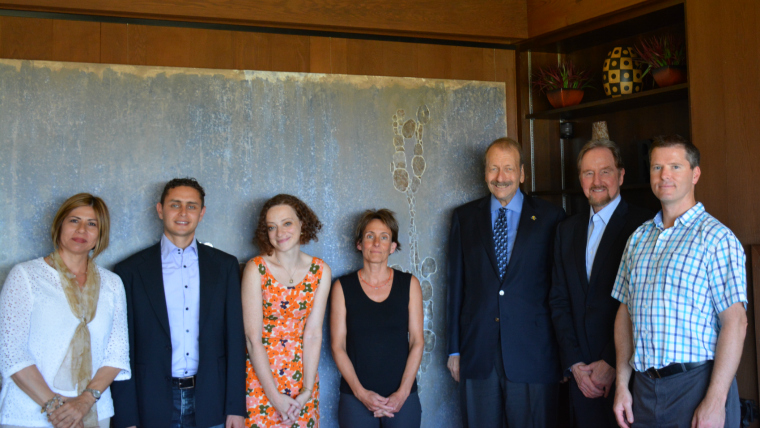The Excellence in Teaching Awards given each year by the UC Santa Cruz Academic Senate Committee on Teaching are among the highest honors faculty members can receive. The awards honor instructors who have demonstrated exemplary and inspiring teaching.
Students make the nominations and more than 200 were received this year. Eight faculty members from the arts, engineering, humanities, sciences, and social sciences were selected for their inspirational teaching.
The awards include a $500 prize, with the exception of the Ron Ruby Award for Teaching Excellence in the Physical and Biological Sciences, which includes a $750 prize. Nominees are also asked to submit a personal statement on their teaching philosophies.
“Excellent teaching is a core value at UC Santa Cruz,” Chancellor Blumenthal said at the June 8 luncheon when the awards were presented. “It's central to the student experience.” It’s not either/or, he said. “UCSC values research and teaching, and we do both exceedingly well.”
The winners of the Excellence in Teaching Award for 2015 are:
Grace Peña Delgado
Associate professor of history
Grace Peña Delgado wrote that she never imagined herself as a university professor but now finds that “teaching is not about instructing or imparting information to students as if their minds were empty vessels waiting to be filled with knowledge. Rather,” she wrote, “teaching means empowering students to be active agents in their learning, inspiring courage to grow intellectually, cultivating curiosity, and co-producing course content.”
Cormac Flanagan
Professor of computer science
Cormac Flanagan teaches at all levels of the computer science curriculum and said he considers teaching his most important responsibility at UC Santa Cruz. One student wrote, “He has bent over backwards to share this passion and ensure that his students understand the material. By far the best computer science professor on campus.”
Craig Haney
Professor of psychology
Craig Haney is one of the most respected social psychologists in the country, with expertise in the criminal justice system, capital punishment, and the psychological effects of incarceration. Students remarked on Haney's ability to help them see things in new ways—and to get involved in improving the criminal justice system.
”There is no other professional activity that I find more enjoyable or rewarding than teaching,” Haney wrote. He boiled down teaching excellence to four components: passion for the subject matter; realism, bringing the real world into the classroom; rigor (he assigns so much reading he said he is surprised to be nominated for teaching excellence); and finally, empowerment, leaving students with a sense of direction and confidence to make a difference.
Christine Hong
Assistant professor of literature
In a supporting letter, literature chair Carla Freccero wrote that Christine Hong’s teaching “demonstrates tireless commitment, rigor and dedication to student achievement and especially to the success and flourishing of underrepresented students—and thus diversity—at UCSC.”
A student nominator wrote, “I hope UCSC recognizes Christine for her knowledge, her scholarship, and for her humanity. She's the kind of teacher who inspires me to be a better human and the best teacher I can be.”
Irene Lusztig
Associate professor of film and digital media<
When I teach,” Irene Lusztig wrote, “I encourage my students–at both the undergraduate and graduate levels–to understand their own production practice in a critical or historical framework: It’s a priority for me to make sure my students understand that theory and practice are deeply intertwined.” Her students responded. One wrote, “She is an invaluable resource to the students in the Film and Digital Media Department and exemplifies the care, attention, and commitment that is excellence in teaching.”
Mark Massoud
Assistant professor of politics
In his letter of nomination, politics chair Ronnie Lipschutz noted several of the strategies Mark Massoud uses: role playing, in-class debate, student presentations, and guest lectures. In his own letter written with the benefit of six years of hindsight, Massoud wrote to himself as a new teacher. He offered assurance that "everything will be fine," and outlined five tips for success: be accessible, authentic, and fearless in your teaching; appreciate diverse learning styles; reward and revel in the students' hard work; be humble and allow yourself to be humbled by your colleagues, teaching assistants, and students; and set an example that your students and you can believe in.
Ralph Quinn
Lecturer in psychology
In a statement on the four elements of excellence in teaching, Ralph Quinn recalled a teacher of his in college whose love of the subject matter and ability to communicate it was foremost. “Masterful teachers have both a command of their subject matter and the facility to discuss it with eloquence,” Quinn said. “They are both scholars and communicators.” High standards and an openness to students – a humanness complete the list.
Adriane Steinacker
Lecturer in astronomy and astrophysics
Adriane Steinacker is the recipient of the Ron Ruby Award for Teaching Excellence in the Division of Physical and Biological Sciences. “Professor Steinacker is 100 percent committed to the excellence of her students,” one student wrote. “She is extremely encouraging and has given me, and many others who I have talked to, a love of physics, and a better understanding of the natural world around us.”
“My students’ progress and success in my classes and, most importantly, their ultimate success is the fuel that sustains my momentum,” Steinacker wrote in her statement on teaching. “I am humbled by the gratitude they expressed in nominating me.”



